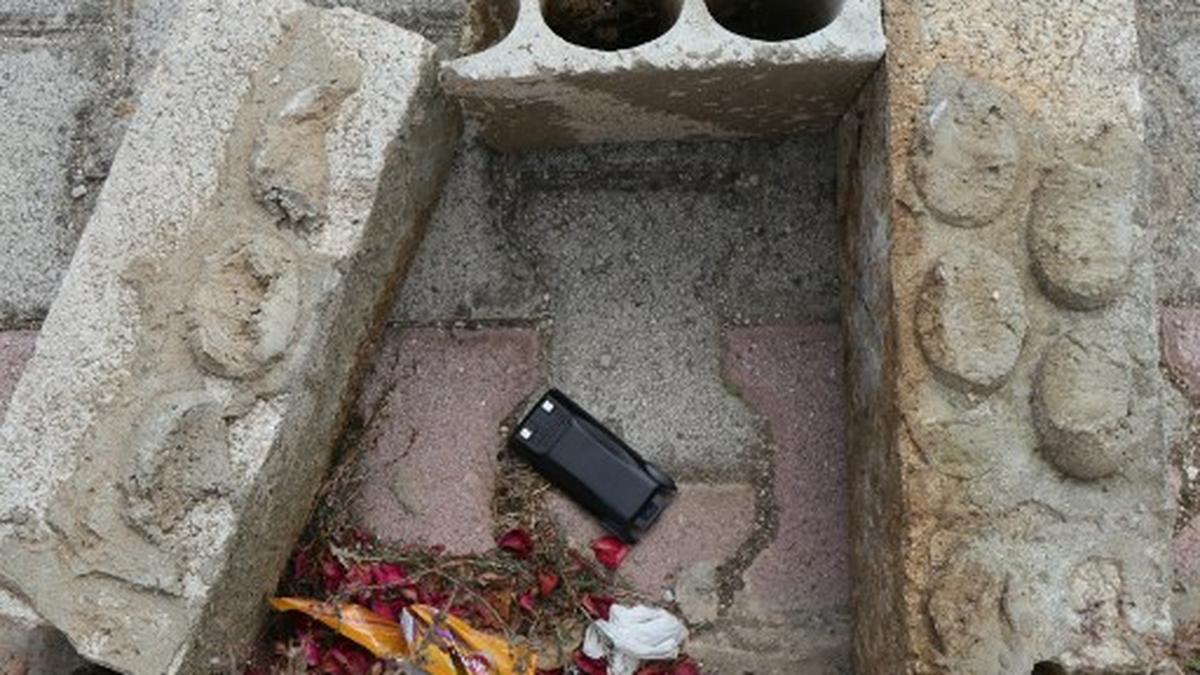A communication device on the ground as Lebanese Army forces (not in picture) prepare to destroy it in a controlled explosion, in southern Lebanon between the villages of Burj al Muluk and Klayaa, on September 19, 2024.
| Photo Credit: AFP
On Sunday (September 15, 2024), Benjamin Netanyahu, the Israeli Prime Minister, told his security Cabinet that he would do whatever necessary to make sure that the 70,000 Israelis displaced from the northern border villages by the fighting with Hezbollah, return home. Two days later, on Tuesday (September 17, 2024), in the late afternoon, hundreds of pagers, a low-tech messaging device, started exploding simultaneously across Lebanon and parts of Syria. At least 12 people were killed and over 2,800 were injured. A day later, on Wednesday (September 18, 2024), walkie-talkies and other electronic devices exploded in Lebanon, leaving 20 more dead and at least 450 others injured.
The explosions mostly hit Hezbollah, the Shia militia group backed by Iran which has been using pagers and walkie-talkies for communication among its ranks. Hezbollah immediately blamed Israel for the attack. Iran accused Israel of mass murder in Lebanon. Several others raised questions about weaponising civilian communication devices. Lebanon’s health officials said there were at least two children among the dead and that they can’t say with certainty how many of the victims were civilians and how many of them were Hezbollah members. Israel has neither confirmed nor denied its role in the explosions — its standard response when it comes to controversial overseas operations. But if Israel is really behind the attack, the question is how they pulled an attack of this scale off.
Also Read | Pager attack on Hezbollah: A low-tech gadget blitz redraws the contours of the Israel-Iran conflict
Taiwanese connection
Initially there were different theories pointing to different possibilities, including cyber warfare and supply-side penetration to tamper with the devices. Most of the pagers that exploded were AR924s that carried the brand name of Gold Apollo, a Taiwan-based company founded in 1995. After Tuesday’s (September 17, 2024) explosions, Gold Apollo issued a statement, saying it was not involved in the production of the pagers in question. “The product was not ours. It was only that it had our brand on it,” Gold Apollo founder and president, Hsu Ching-kuang, told reporters at the company’s office in New Taipei on Wednesday (September 18, 2024).
In the statement, the company said the AR924 model pagers were manufactured by BAC Consulting KFT, a Hungarian company. “Gold Apollo has established a long-term partnership with BAC Consulting”, and it has authorised “BAC to use our brand trademark for product sales in specific regions, but the design and manufacturing of the products are entirely handled by BAC,” the short statement said. Gold Apollo did not offer any details about its contract with BAC.
Watch: What’s Hezbollah, and why is the militia permanently at war with Israel?
Hungarian connection
BAC Consulting, based in Budapest, operates in “environmental, political and development projects”, according to the company’s LinkedIn page, which has 303 followers as of Thursday (September 19, 2024). The page has no reference to the company’s involvement in manufacturing of electronic devices. It says BAC works to find “innovative solutions” to tackle challenges of “development, international affairs and environment”. Cristiana Rosaria Bársony-Arcidiacono, a 49-year-old PhD in particle physics, is the CEO of the company.
According to Ms. Bársony-Arcidiacono’s LinkedIn profile, she has advocated “environmental and social causes for developing and fragile countries” and has published articles in science journals. She did her PG masters in SOAS, London, and a diploma in politics from the London School of Economics and Political Science. But what does a particle physics PhD with experience in the fields of environmental and developmental consulting have to do with pager manufacturing? “I don’t make the pagers. I am just the intermediate. I think you got it wrong,” Ms. Bársony-Arcidiacono told U.S. broadcaster NBC on the phone. But she did not say BAC was not involved. And if Gold Apollo is to be believed, the little-known Budapest-based company that claims to be working in the fields of development and environment consulting was designing and manufacturing Taiwanese pagers and selling them to Hezbollah in Lebanon and parts of Syria. And they exploded at a critical juncture of the Hezbollah-Israel war. Both the knowns and unknowns of the explosion saga point to bigger behind-the-scenes players.
Also Read | Japan firm says they no longer make radio reportedly used in Lebanon blasts
The hidden hand
According to a New York Times report, which cites defence and intelligence officials, BAC Consulting was a front company of the Israeli intelligence agencies. The report says Israeli intelligence officials set up three shell companies, including BAC, which was formally registered in Hungary in 2022. Hezbollah was wary of using cell phones, fearing Israeli penetration. They turned to pagers for communication, and Israel established a company to make those pagers — with inbuilt PETN (pentaerythritol tetranitrate) explosives, and a switch to detonate them remotely.
The back-to-back explosions have dealt a blow to Hezbollah, whose senior commander Fuad Shukr was assassinated by Israel on July 30 in Beirut. Israel has once again demonstrated its willingness and capability to take great risks in attacking its rivals. But with Hezbollah vowing vengeance, tensions on Israel’s northern border are likely to flare up in coming days.
Published – September 19, 2024 05:42 pm IST
